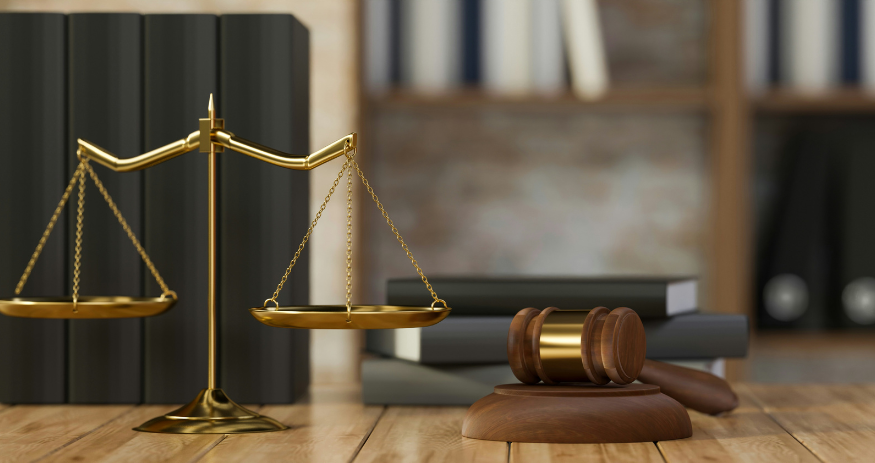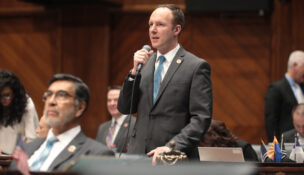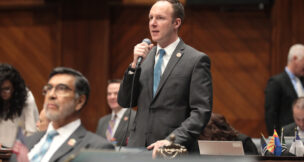Supreme Court changes rules on attorney discipline
Kiera Riley Arizona Capitol Times//August 29, 2024//
Supreme Court changes rules on attorney discipline
Kiera Riley Arizona Capitol Times//August 29, 2024//
Those who submit State Bar of Arizona complaints without a direct tie to a case are no longer entitled to the same information and right to be heard in disciplinary proceedings under new rules adopted by the Arizona Supreme Court.
The request for a rule change, submitted by Dave Byers, administrative director of the Arizona Supreme Court, cited an increase in election-related attorney complaints submitted by people with no direct involvement. The new rule was given emergency adoption prior to the coming 2024 election.
“For the first time, we started seeing these complaints coming in from people who have no knowledge, no involvement in the case,” Byers said. “They have nothing, no involvement, no evidence.” And if they become the complainant, they have certain rights, like, if the Bar decides to dismiss the case, they can appeal it. They get updates in the case. And they’re just completely not involved.”
Supporters argued the change was necessary given the perceived “politicization” of the Bar complaint process, while those rallying against the rule change stressed the loss of a mechanism to hold attorneys accountable for ethical breaches.
The petition, submitted by Byers, would allow only those who are directly involved in a matter to be privy to proprietary information and rights to be heard related to a Bar proceedings.
Information on State Bar proceedings are typically kept confidential until they are elevated to the presiding disciplinary judge. Under the rule change, a person who was not involved could still submit a complaint, but they would not be afforded the same information and rights to appeal as a party in Bar proceedings and instead designates the State Bar as the complainant, so long as the Bar deems it to be “serious misconduct.”
Byers pointed to an influx of election-related complaints from non-parties as the basis for the new standing requirement, noting in the petition that the Bar had received at least 40 election-related cases submitted since November 2020.
“Prior to recent election cycles, few charges concerning attorneys were submitted for investigation by individuals unrelated to the underlying events,” Byers wrote. “During the past several years, however, charges have been submitted by individuals based on second-hand information concerning the alleged misconduct, such as news reports.”
Byers said the current system could lead to the “politicization” of the Bar regulatory system and allowing the status quo to stay in place would “create a risk of the disciplinary process being weaponized by partisans or the appearance of that occurring,” in the petition to the Arizona Supreme Court.
“We’re in a very hyper partisan environment, and it does appear, right or wrong, that some people are militarizing the regulatory process,” Byers told the Arizona Capitol Times. He said the trend he has noticed is “Democratic leaning groups filing these complaints against Republican lawyers, or lawyers working on Republican cases.”
Senate President Warren Petersen lodged his support of the rule change in a public comment and referenced attempts to address the same perceived “weaponization” in the last legislative session. Sen. Anthony Kern, R-Glendale, via a strike-everything amendment, proposed legislation requiring the State Bar to “dismiss without comment or investigation” complaints filed by someone without “an attorney-client relationship with the attorney or another substantial nexus to the attorney’s alleged violation or conduct.”
The measure made it through the Senate but stalled in the House.
Dianne Post, an attorney, wrote in opposition to the rule change, noting an attorney’s ethical duty to report misconduct.
“When we see another lawyer acting unethically, we are obligated to report,” Post said.
Post, alongside colleagues, filed 22 complaints against election attorneys who she deemed as having “filed many false and fraudulent claims without legal facts or legal analysis in the Arizona courts, and wasted a lot of time and money,” starting in late 2021.
She said the rule change stands to undermine transparency and effectiveness of the complaint process and does so prior to another expected deluge of election contests.
“We are here to try to make the system of the rule of law work and to make ethics mean something,” Post said. “Lawyers are not supposed to be filing a complaint without investigating the facts and the legal premise upon which they face jurisdiction. And it’s clear that, over and over and over again, these election deniers did that.”
She continued, “Even though they lost their cases, it damages, in the public’s opinion, the validity of our election.”
Post claimed there was a lack of consequences for attorneys after the 2020 and 2022 elections.
“We know that after this election in November, there will be many, many, many false complaints filed again because the system didn’t work and they were not held responsible,” Post said. “So as long as they make this the rule … We can’t protect the public. We can’t protect the rule of law from these kinds of attorneys who are misusing the rule in order to come to a political decision that they want.”
The rule change follows the state disciplinary panel’s decision to dismiss the entirety of an ethical complaint against attorneys Kurt Olsen and Andrew Parker, who represented then-gubernatorial candidate Kari Lake and then-Secretary of State candidate Mark Finchem in a legal bid to see electronic voting systems outlawed ahead of the 2022 election.
Lake’s attorney in her election contest, Bryan Blehm, was suspended for 60 days for claiming to the Arizona Supreme Court that it was an “undisputed fact” that more than 35,500 ballots were illegally inserted into the 2022 election. The State Bar initially requested a six month and one day suspension, which would have required Blehm to go through a reinstatement process to practice law again.
The rule change will take effect immediately, though will undergo another public comment process starting in October. In the December 2024 Rules Agenda, the court will consider whether to make the change permanent.














































